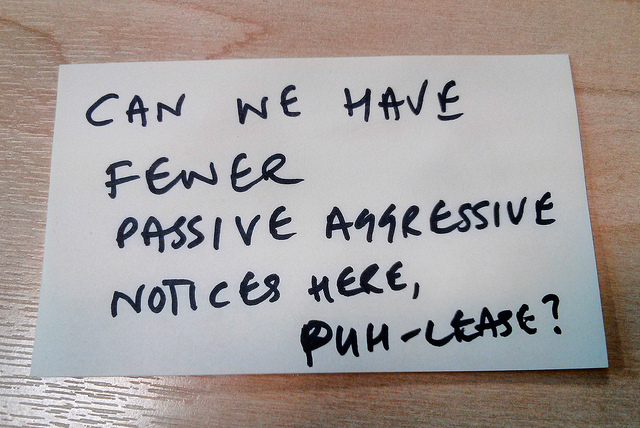When people talk about abusive relationships, they’re usually talking about active aggression. Somebody is being verbally or physically abusive. When the aggression is overt, the signs are obvious, and the situation is easy to diagnose. This is where both partners get into shouting matches or throw things at each other from across the room.
But there’s another type of aggression which isn’t talked about so much in the mainstream media or in conversations among friends – a type of aggression that goes unseen but is still destructive to our relationships. Psychologists have a phrase for it: they call it passive aggression.
Passive aggression is different to active or overt aggression. In passive aggression, it wouldn’t appear to a stranger that a person is being aggressive to their partner. Two people could be sitting in the car or at a table in a restaurant, and you wouldn’t normally be able to tell something was remiss. But silent aggression is a real phenomenon in relationships.
Perhaps the most common form of passive aggression is the “silent treatment” where one partner doesn’t say anything to the other. The purpose of doing this is to be aggressive to the other partner by making them feel isolated and uncomfortable and to keep them in a state where they don’t know what they’ve done wrong – if anything.
These signs of silent treatment abuse or shunning are NEVER okay, according to therapists. People in passive aggressive relationships need to understand what is happening to them so that they can identify the problem and take action. Remember, the whole purpose of passive aggression is to conceal the aggression and get the victim to accept that they have somehow done something wrong.
When you think about it, passive aggression is a weird thing. Why not be actively aggressive instead? Usually, it’s because they were raised in an environment where being open and honest about their feelings was impossible. They couldn’t just voice their preferences publicly and expect to get a hearing. Instead, they always had to defer to the wishes of somebody else, usually a parent. As they got older, they began to learn that they could sabotage their parent’s wishes and get their own way through passive aggression, whether that was giving them the silent treatment, crying all the time or behaving badly in public. These personality traits don’t usually vanish as a person gets older. Instead, they refine them and use them as a way to get back at people, rather than confront them directly.
Here are some signs you’re in a passive aggressive relationship.
Disguised Hostile Humor
Some passive aggressive people are very sophisticated in the way that they aggress against other people. One way to do it is through disguised, hostile humor. If you find yourself at the end of repeated, subtle digs where your partner insists that they are “only joking” you could be in a passive aggressive relationship. Humor is a great disguise for aggression because it’s something we usually associate with being funny. But it can be used to hide things like anger and disapproval, or a rejection of who you are and what you stand for. If humor feels like a weapon forged against you, chances are you’re in a passive aggressive relationship.
Disguised Psychological Manipulation
Another common technique is what psychologists call disguised psychological manipulation. This is where a person lies, makes excuses or says one thing to one person but something entirely different to somebody else.
Psychology manipulation can also take the form of “button pushing.” This often happens in situations where a partner knows you well enough to know exactly what things wind you up or hurt you the most. They then find ways to push these painful buttons, causing you distress.
Another form of disguised manipulation is springing unpleasant surprises on your unnecessarily. These surprises are designed to keep you off balance and keep you wondering when the next crisis is going to occur. People do this because they want to avoid responsibility, want control over your emotions or want to take your mind off the real issues.
Stalling
Stalling is the name psychologists give to things like “forgetting” and procrastinating. One way of being passive aggressive is when your partner says that they “forgot” about something, especially when it comes to things that they know hurt you. Forgetting is a way of avoiding responsibility. Forgetting can also be used to justify when they didn’t do something or simply to infuriate you. Procrastination is also damaging, especially if your partner has responsibilities, like bringing in income to support your family.

We help people who are looking for “Take my GED for me” or “Take my TEAS exam” answers. Do you need help with your TEAS or GED test? We provide services that let you pay someone to take your GED or TEAS exam or hire someone to help you study for the test and find answers.
Pay Someone To Take My GED Exam
We provide support for those looking for ‘Take my GED for me’ or ‘Take my TEAS exam’ solutions. Need help with your GED or TEAS exam? We offer services so you can pay someone to take your GED or TEAS exam, hire someone for exam assistance and solutions.
Pay Someone To Take My TEAS Exam